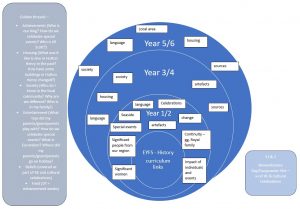Books you might explore at home
Intent
In History, our aims are to fulfil the requirements of the National Curriculum for history; providing a broad, balanced and differentiated curriculum; ensuring the progressive development of historical concepts, knowledge and skills; and for the children to develop a love for history and curiosity about their local area. Furthermore, we aim to inspire pupils to have an inquisitiveness and fascination about history that will remain with them for the rest of their lives. A high-quality history education will help pupils gain a coherent knowledge and understanding of Britain’s past and that of the wider world (The 2014 Primary National Curriculum in England). We aim to equip children with both the knowledge and skills to enable them to have an understanding of the world relative to the events of the past, and the significant events and individuals who led change.
History teaching at Hutton Henry CE Primary School has a wide application to everyday life, teaching the children to enjoy learning about the past and to have a better understanding of the society in which they live.
The core areas below are used throughout history units to ensure that teaching is both knowledge and skills based.
Developing Historical Knowledge
Chronology
Historical terms
Enquiry
Continuity and Change
Causation
Similarity and difference
Explaining/ Analyse second order concepts
Use of primary sources
Interpretations/ representations of the past
Implementation
To ensure high standards of teaching and learning in history, we implement a curriculum that is progressive throughout the whole school. History is taught as part of a termly topic, focusing on knowledge and skills stated in the National Curriculum. Our school Key Knowledge objectives are a minimum requirement for learning objectives and are also used to assess the children each term. Teacher’s short term planning should use these objectives to plan a progressive series of lessons which includes the skills and knowledge together to develop the children’s history ability.
History at Hutton Henry CE Primary School begins in EYFS and is then built on across Key Stage 1 and 2 . What does history look like in the EYFS?
The history long term plan has been designed so that EYFS and KS1 children learn about history time periods that are closest to their own experience, with KS2 time periods being further away, as the children develop their own ability to understand the abstract nature of a civilisation thousands of years ago. Units that require the children to understand and compare how an element of history has changed over time are planned inY5 and 6 when they have developed the maturity to master these higher level skills. Across the school, children build on previous time periods and topics studied and the long term plan has been carefully designed to ensure that the children’s reference points and previous learning support their journey through the classes.
Within each topic, the understanding of chronology is key to children’s history learning. Classroom displays include a timeline containing the relevant time periods for that phase and teachers refer to it regularly during lessons. The key topics of Clothing, Religion and Beliefs, Settlements and Society, and Food and Farming are covered throughout the topics and across key stages, although not all will be covered in each individual lesson or topic. The EYFS curriculum introduces children to these and the curriculum from Y1 to Y6 is then designed to revisit, relearn and study history in more depth building on these EYFS foundations.
Links in the history curriculum from EYFS to Year 6

When teaching history, the teachers ensure their learning is engaging, broad and balanced. History teaching focuses on enabling children to think critically. A variety of teaching approaches are used based on the teacher’s judgement.
The teaching of history may not take place every term, or may be taught across a whole term or half a term (often back-to-back with another subject such as geography).
Educational visits are another opportunity for the teachers to plan for additional history learning outside the classroom. At Hutton Henry CE Primary School, the children have had many opportunities to experience history on educational visits. The children have explored local museums such as Beamish and Heugh Battery and welcomed visitors into school to share history knowledge and experience hands on learning.
What do our pupils say about History in our school
“We love when history matches our art lessons”
“I love History! “
“We don’t just learn, we have fun”
“We learn loads in school “
“We don’t just learn about old things, we look at things that are old and things from now “
Pupil Voice 2024
Impact
Our history curriculum has a significant impact on pupils’ personal development, local context and preparation for life in modern Britain. Pupils become confident, reflective, and open-minded learners, who appreciate diversity, value historical evidence, and are able to communicate their ideas effectively. Pupils develop a deep and secure understanding of historical concepts, themes, and periods. Our pupils are also well-prepared for the challenges and opportunities of adulthood, including active citizenship, cultural appreciation, and social responsibility.
